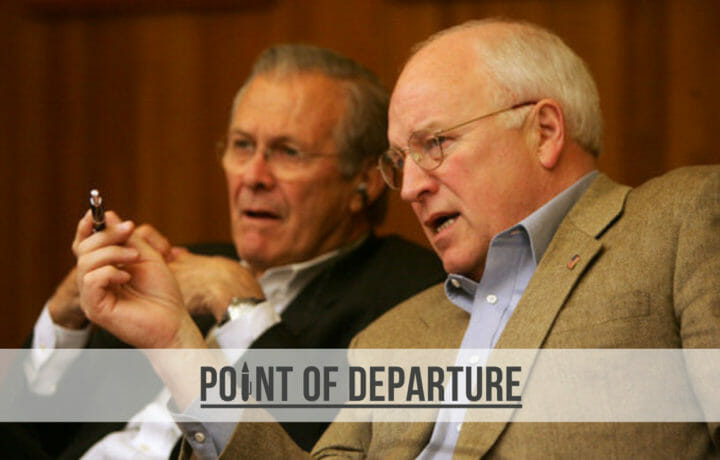“You go to war with the army you have, not the army you might want or wish to have at a later time.” – Donald Rumsfeld
Few of us accomplish as much in our lives as Donald Rumsfeld. A Navy veteran and Princeton graduate, he was elected to Congress in 1962 at the age of 30, representing Illinois’s 13th District. There, he was a leading co-sponsor of the Freedom of Information Act. After joining the Nixon administration in 1969, he was appointed ambassador to NATO before returning to Washington in 1974 to serve as White House Chief of Staff to President Gerald Ford. A year later, he became the youngest Secretary of Defense when Ford nominated him to lead the Pentagon, ultimately returning to private life after Jimmy Carter won the presidential race in 1976. But the federal government wasn’t through with him. When George W. Bush won the White House in 2000, Rumsfeld returned to the Pentagon, becoming both the oldest person to serve as defense secretary and the only one to hold the position twice.
For most of us, that resume would be an incredible legacy. But for Rumsfeld, that legacy is, well… complicated.
After Rumsfeld joined the Nixon administration, the late president expressed his concerns to Chief of Staff H.R. Haldeman. While acknowledging that Rumsfeld was “tough enough” to serve successfully in the administration, Nixon didn’t completely trust him, referring to him as a “ruthless little bastard.” That’s not exactly a ringing endorsement from the only President to resign from office. In his 2007 book, Rumsfeld: His Rise, Fall, and Catastrophic Legacy, author Andrew Cockburn details Rumsfeld’s orchestration of the “Halloween Massacre” in October 1975, the major reorganization of the Ford cabinet that allowed him to become Secretary of Defense and a young Dick Cheney to succeed him as Chief of Staff. Cockburn expands on Rumsfeld’s accomplishments in business, first with G.D. Seale (where he successfully lobbied for FDA approval for the artificial sweetener aspartame, a suspected carcinogen), then later with the Swiss company ABB (where, as a member of the board of directors, voted to approve the sale of light-water nuclear reactors to North Korea in 1991).
But it was during his second stint as defense secretary where things really got complicated. When President George W. Bush’s first choice for the position was unavailable, Cheney—back in the White House as Vice President—pushed Rumsfeld for the job. There, he was widely considered to be the most powerful Pentagon chief since Robert McNamara and arguably the most influential cabinet member behind Cheney. Following the attacks of 9/11, that influence was cemented. It might not have been a second Halloween Massacre, but their presence—in the shadows or otherwise—was always lingering.
When Secretary of State made the case before the United Nations for a second invasion of Iraq, he had no way of knowing at the time how flawed the intelligence was that he was citing. His speech—what he now calls a “blot” on his record—was prepared not by the National Security Council or the CIA, but by Cheney’s office. By this time, Rumsfeld had already testified to the Senate that Iraq had stockpiled chemical and biological weapons and had an active program to develop nuclear weapons. Powell’s speech was the trigger for an invasion, one possibly orchestrated by the same men who decimated Ford’s cabinet in a single night nearly 30 years earlier.
As that invasion neared, everyone from Powell to outgoing Army Chief of Staff Eric Shinseki warned of the enormity of post-war task ahead. When Rumsfeld’s combatant commander, General Tommy Franks, failed to produce a plan for reconstruction and stabilization, he tapped retired lieutenant general Jay Garner, who had led the relief of northern Iraq in the wake of the Gulf War. That effort produced a viable plan, but when the time came to implement it, Rumsfeld changed his mind again and instead sent L. Paul Bremer—a diplomat with no experience in Iraq and no plan—to lead the Coalition Provisional Authority (CPA).
Once in Iraq, Bremer—who answered directly to Rumsfeld—inexplicably issued CPA Orders 1 (banning the Ba’ath party in any form) and 2 (dismantling the Iraqi Army), decrees that spurred a nascent insurgency that would engulf the country for years to come. I have never been convinced that Bremer made those decisions on his own, although he accepted blame for the consequences. When widespread looting swept the country, Rumsfeld responded, “Stuff happens.” When forces lacked the necessary equipment to combat the growing insurgency, he offered only the quote that opens this piece. His role in endorsing torture tainted America’s reputation abroad in incalculable ways: “I stand for 8-10 hours a day,” he wrote of interrogations. “Why is standing [of detainees] limited to four hours?” His words, his actions, and his cavalier attitude would haunt his legacy. The day before voters, angry over the catastrophe that enveloped Iraq, swept Republicans out of power in Congress in 2006, Rumsfeld offered his resignation.
Rumsfeld’s role in national security over the past half century is solidified. His legacy is far from it.




